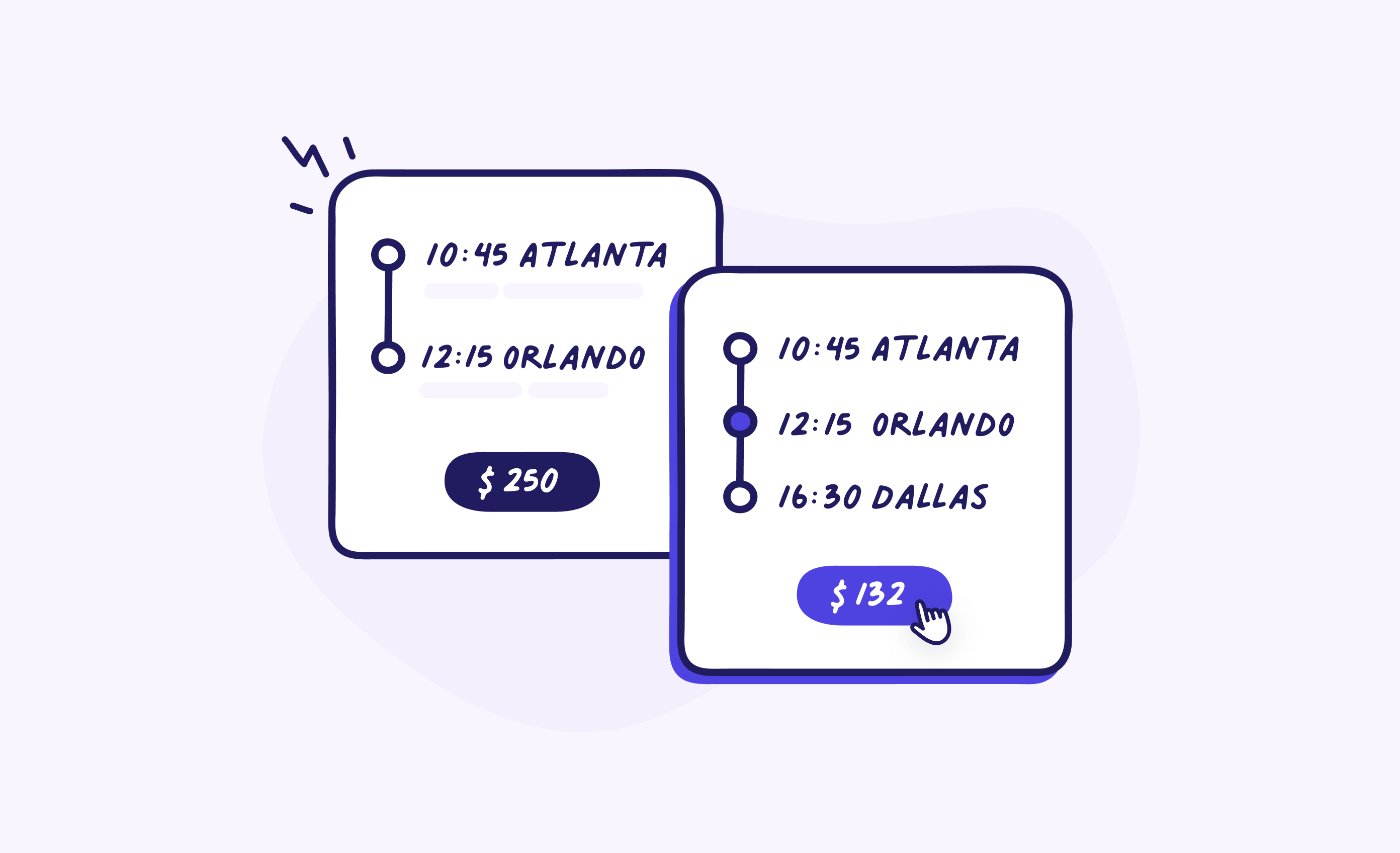It’s a cheeky airline hack that’s caused quite the buzz recently.
Simply put, skiplagging is when you buy a ticket for a connecting flight but disembark at the layover city—your real destination—and skip the second leg.
Curious about how often Americans use this tactic, their reasons, the fallout, and their take on its ethics?
At Passport Photo Online, we’ve surveyed over 1,000 travelers to get the scoop.
Dive in to see what we uncovered.
Key Takeaways
- The majority (35%) skiplag on about 25–50% of their trips, with Gen Zers most likely to engage in this tactic.
- The key reasons for skiplagging are cost savings (19%) and more convenient departure or arrival times (17%).
- About 76% of respondents saved at least 10% on their most recent flight through skiplagging.
- A significant 45% support skiplagging for its consumer benefits, while 28% maintain a nuanced view that also questions airline pricing.
- Over half (51.37%) of Americans feel skiplagging introduces considerable stress (40.81%) or a lot of stress (10.56%) into their travel experience.
- The most common consequence experienced by skiplaggers is having their frequent flyer points/status deducted or revoked at 23%.
- Roughly 62% of travelers are likely (47%) or very likely (15%) to skiplag in the future.
Majority Skiplag on Roughly a Quarter to Half of Their Trips
Airline ticket prices can be puzzling.
That’s because they are determined by many factors, including energy costs, passenger demand, and competition from rival carriers.
Interestingly, these factors don’t always correlate with the travel distance.
So—
Travelers have found that booking a flight with a layover and hopping off there can be cheaper than a direct flight to their destination.
For example, picture a traveler from Los Angeles wishing to visit New York.
A quick search on Skiplagged.com shows a flight from LA to Pittsburgh, stopping in NY, priced at $99. Meanwhile, a direct flight from LA to NY costs $158.
That’s a potential saving of $59 (-37%).
With this, we wanted to see how often Americans tap into skiplagging.
Below are the results:
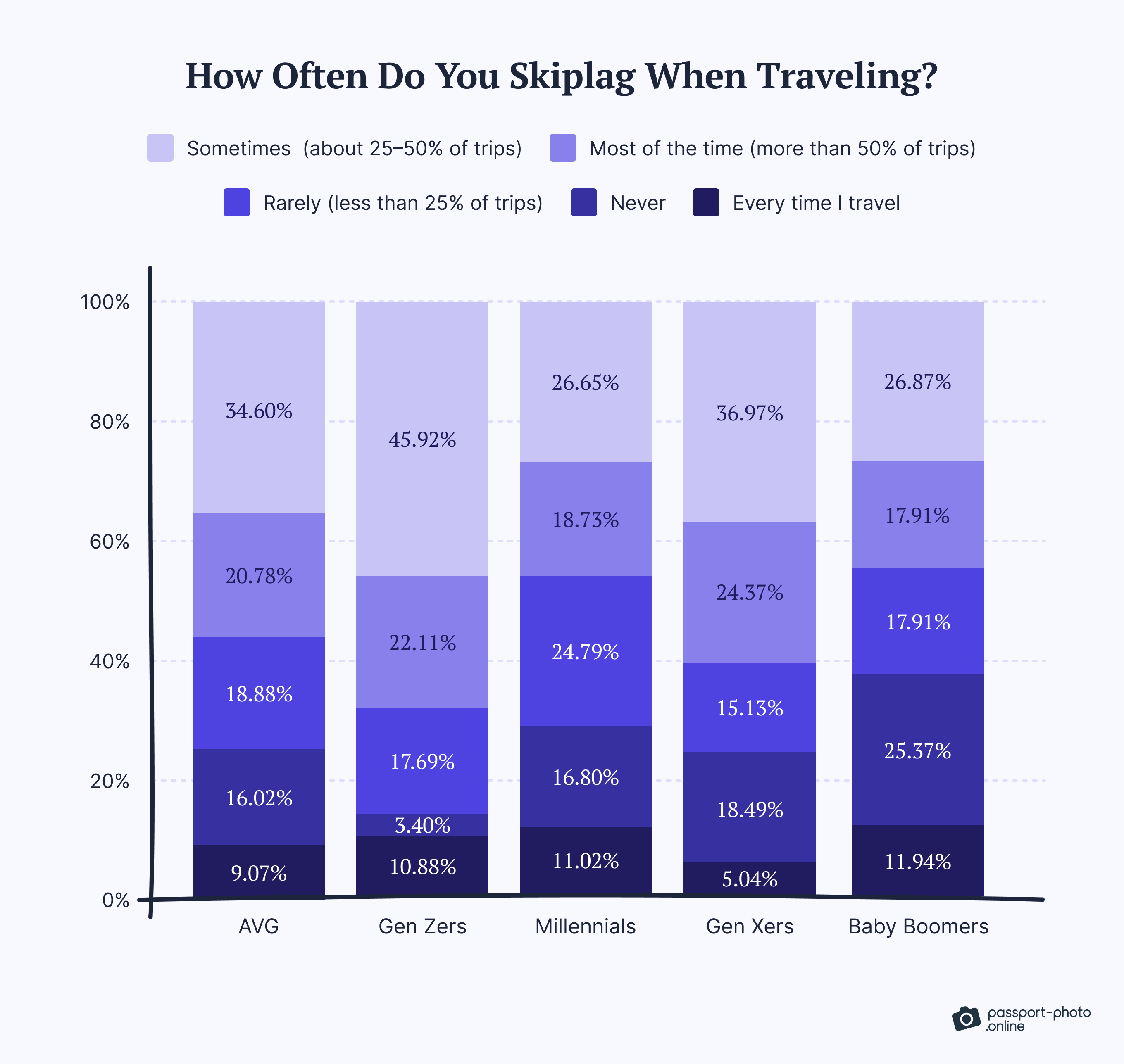
The data suggests that most people skiplag to some extent, with the majority (35%) engaging in this tactic on about 25–50% of their trips. A generation dive also shows that Gen Zers are the most frequent skiplaggers.
Perhaps it’s due to their tighter budgets, tech savviness, and youthful spirit.
Now—
Although skiplagging isn’t illegal, many airlines prohibit it.
Given the potential complications, we were interested in understanding the stress levels associated with this tactic.
Here’s what survey participants said:
| On a 1–5 Scale, How Much Stress or Anxiety Does Skiplagging Introduce into Your Travel Experience? | Share |
|---|---|
| Considerable stress | 40.81% |
| Neutral / No opinion | 26.69% |
| Mild stress | 13.64% |
| A lot of stress | 10.56% |
| No stress at all | 8.3% |
Over half (51.37%) admit that skiplagging gets their adrenaline pumping. Specifically, 40.81% find it considerably stressful, and 10.56% feel it brings a lot of stress.
So—
While there might be financial benefits, the emotional toll can’t be ignored, especially since air travel is ALREADY a nerve-wracking experience for many.
Money and Logistical Convenience Are the Key Reasons to Skiplag
The appeal of skiplagging is largely due to today’s airfare costs.
In fact, the average price of a domestic plane ticket climbed to $381.55 in the first quarter of 2023. That’s a jump of 28.4% from the $297.24 in Q1 2021.
But while saving money is a draw, it’s not the only reason people skiplag.
Though, yes, the financial benefits are tangible. Our data shows nearly 76% of respondents saved at least 10% on flights through this method.
Have a look:
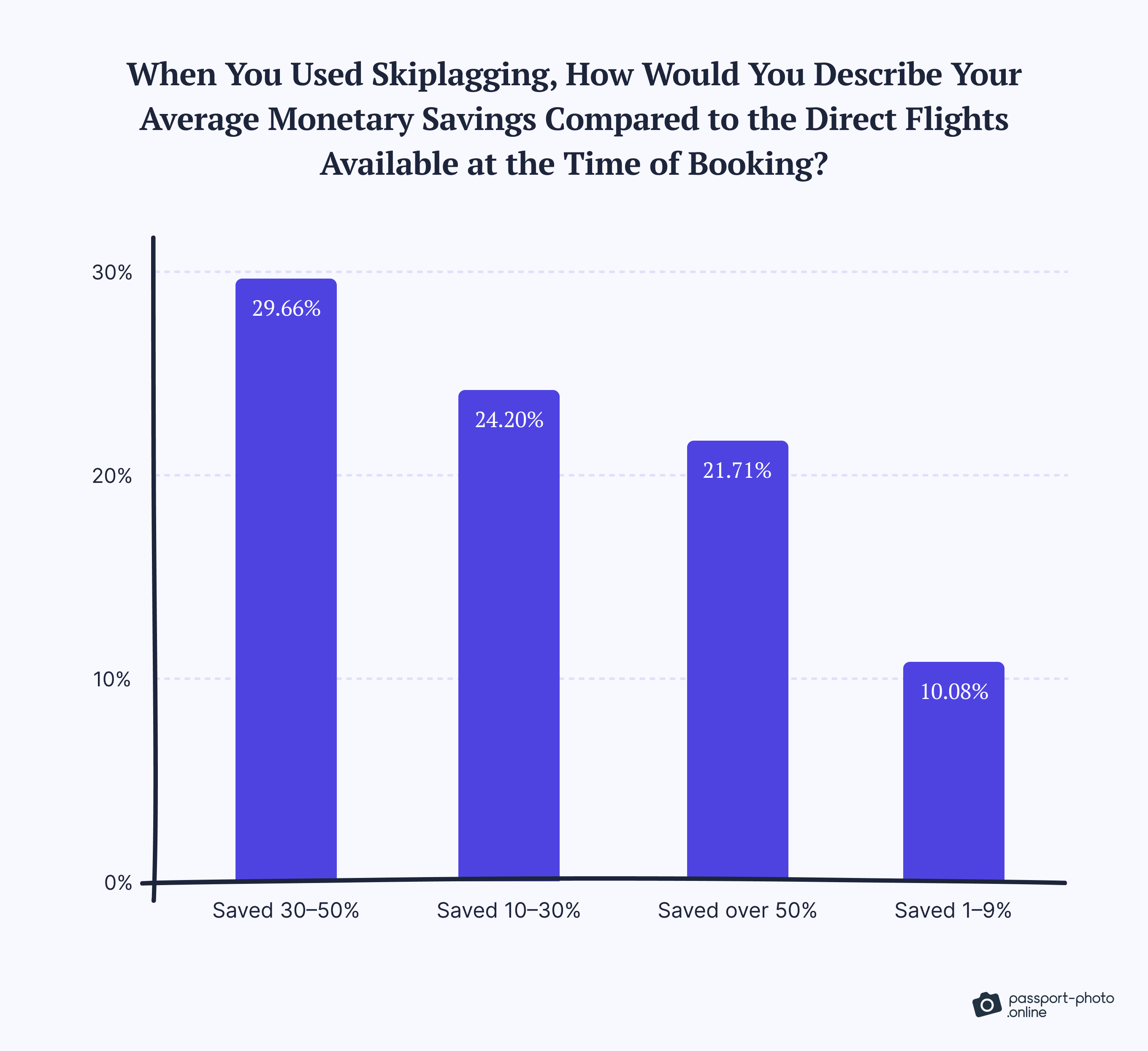
Still—
Beyond the pocket-friendly aspect, we found other motivations for skiplagging:
| If You Have Considered or Used Skiplagging, Which Key Factor Influenced Your Decision? | Share |
|---|---|
| Cost savings | 18.98% |
| More convenient departure or arrival times | 16.84% |
| Availability of desired routes not offered by direct flights | 14.23% |
| The thrill of finding a “deal” or exploiting a “loophole” | 11.51% |
| Shorter travel times | 10.79% |
| Curiosity to experiment | 10.08% |
| Dissatisfaction with airline policies or service | 7.12% |
One such reason is logistical convenience.
In other words, skiplagging can sometimes offer options that align better with travelers’ schedules or provide routes not typically available with direct flights.
As a result, it’s hardly a surprise that 62% of respondents later said they plan to skiplag in the future.
Take a look:
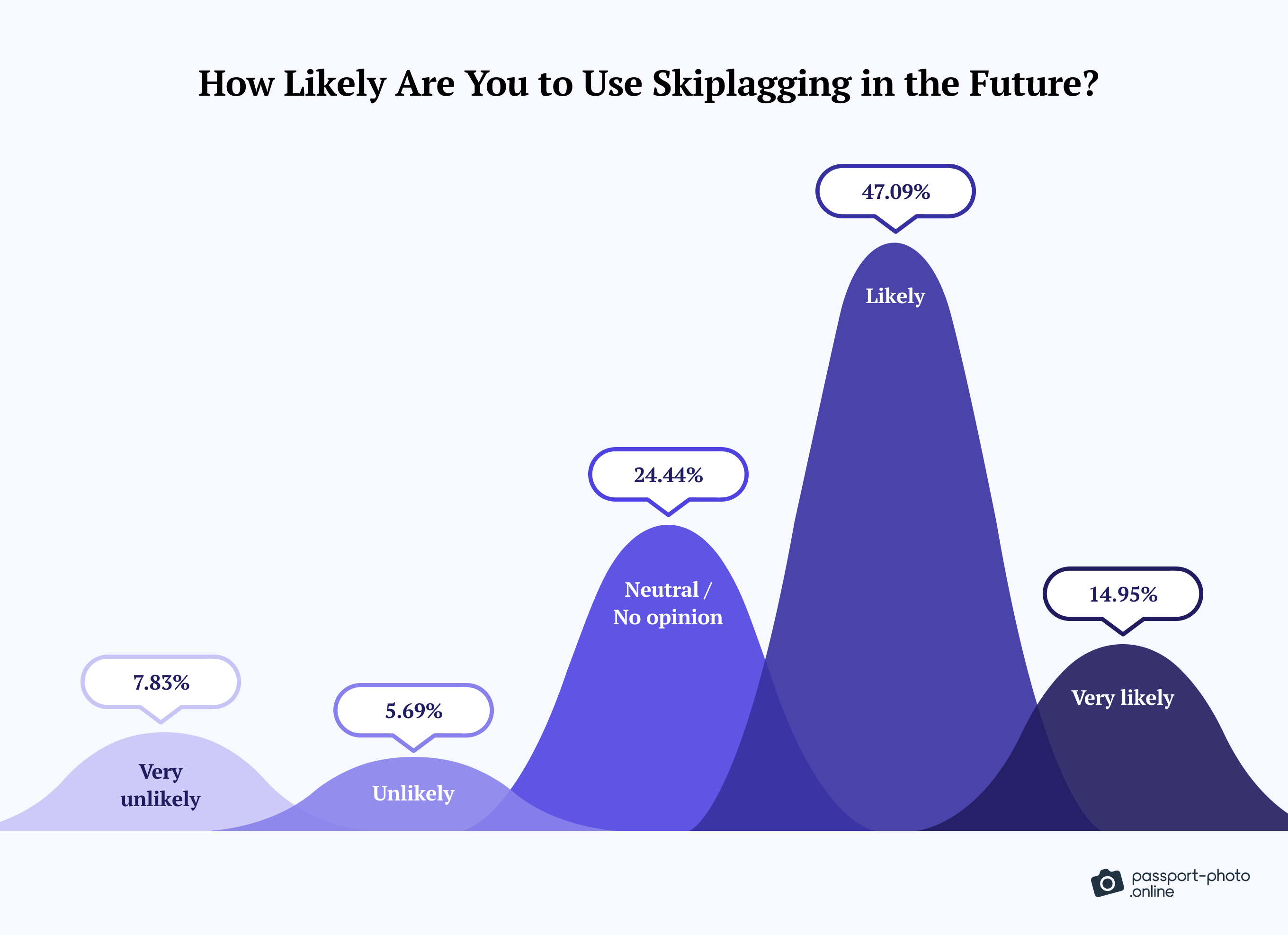
In conclusion, skiplagging has its perks (despite being prohibited by airlines.)
But—is it ethical?
We’ll delve into that in the upcoming segment.
Most Support Skiplagging or Hold a Nuanced View That Questions Airline Pricing
Skiplagging evokes mixed feelings.
On the one hand, airlines claim that hidden-city fares leave seats empty. This means lost opportunities and revenue.
Plus, American Airlines pointed out that searching for absent passengers can delay flights, and incorrect passenger counts result in wasted fuel.
Yet, those in favor of skiplagging see it differently.
They argue that if airlines have loopholes in pricing, isn’t that on them?
Besides, charging more for shorter distances can be seen as unfair, particularly burdening frequent fliers to hub cities where demand often drives up prices.
So—
From our end, we wanted to see where Americans stand on the practice of skiplagging in percentage terms.
The numbers are in:
| How Do You Perceive the Practice of Skiplagging? | Share |
|---|---|
| I have reservations about it, but I also question airline pricing practices | 28% |
| I view it as a valid way for travelers to save money | 25.39% |
| I see it as a system loophole that isn’t harmful | 19.57% |
| I’m neutral or indifferent about the practice | 16.37% |
| I believe it’s unfair to airlines | 10.56% |
As you tell, views on skiplagging run the gamut.
Still, a significant portion of respondents support the practice for its consumer benefits (45%) or maintain a nuanced view that also questions airline pricing (28%).
Now, regardless of where YOU plant your flag on the skiplagging battlefield, there are implications to consider.
We’ll discuss those next.
Lost Frequent Flyer Points/Status Is the Most Common Repercussion of Skiplagging
Airlines give skiplagging the side-eye.
Some travelers have seen their hard-earned frequent flyer miles vanish. A few others were even taken to court, according to media reports.
Given this backdrop, we sought to determine if travelers know what’s at stake when they opt to skiplag.
Here’s what the data shows:
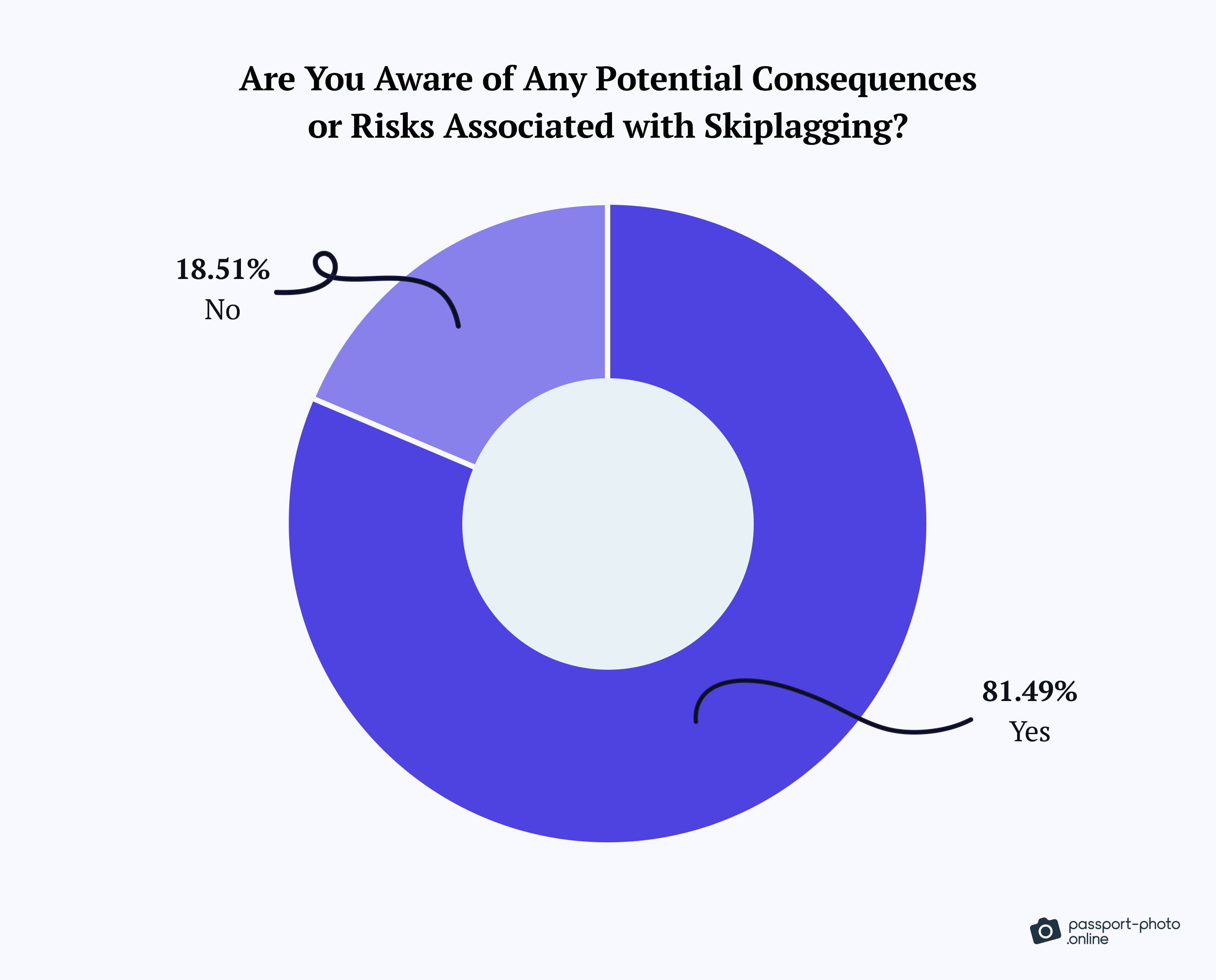
A full 81% of respondents are informed about the repercussions.
But—
Admittedly, it’s difficult for airlines to catch passengers intentionally missing their last leg. If you don’t have checked baggage or show patterns, you’re less likely to land in hot water.
Plus, airlines mostly target online providers that specialize in hidden-city fares, not the individual consumer.
Still, what usually happens if you do get caught?
Let’s have a look:
| Which of the Following Consequences of Skiplagging Have You Experienced? | Share |
|---|---|
| Frequent flyer points or status was revoked or deducted | 22.89% |
| Additional fees charged to my account | 19.1% |
| Warning from the airline | 15.18% |
| Ban or suspension from flying with the airline | 10.08% |
The data suggests that losing frequent flyer points or status is the most common consequence, pulling in 23% of the vote. It’s followed by 19% of respondents who were charged extra fees, likely to make up for perceived revenue loss.
In this context, we also inquired if these negative experiences deter travelers from skiplagging.
Below are the results:
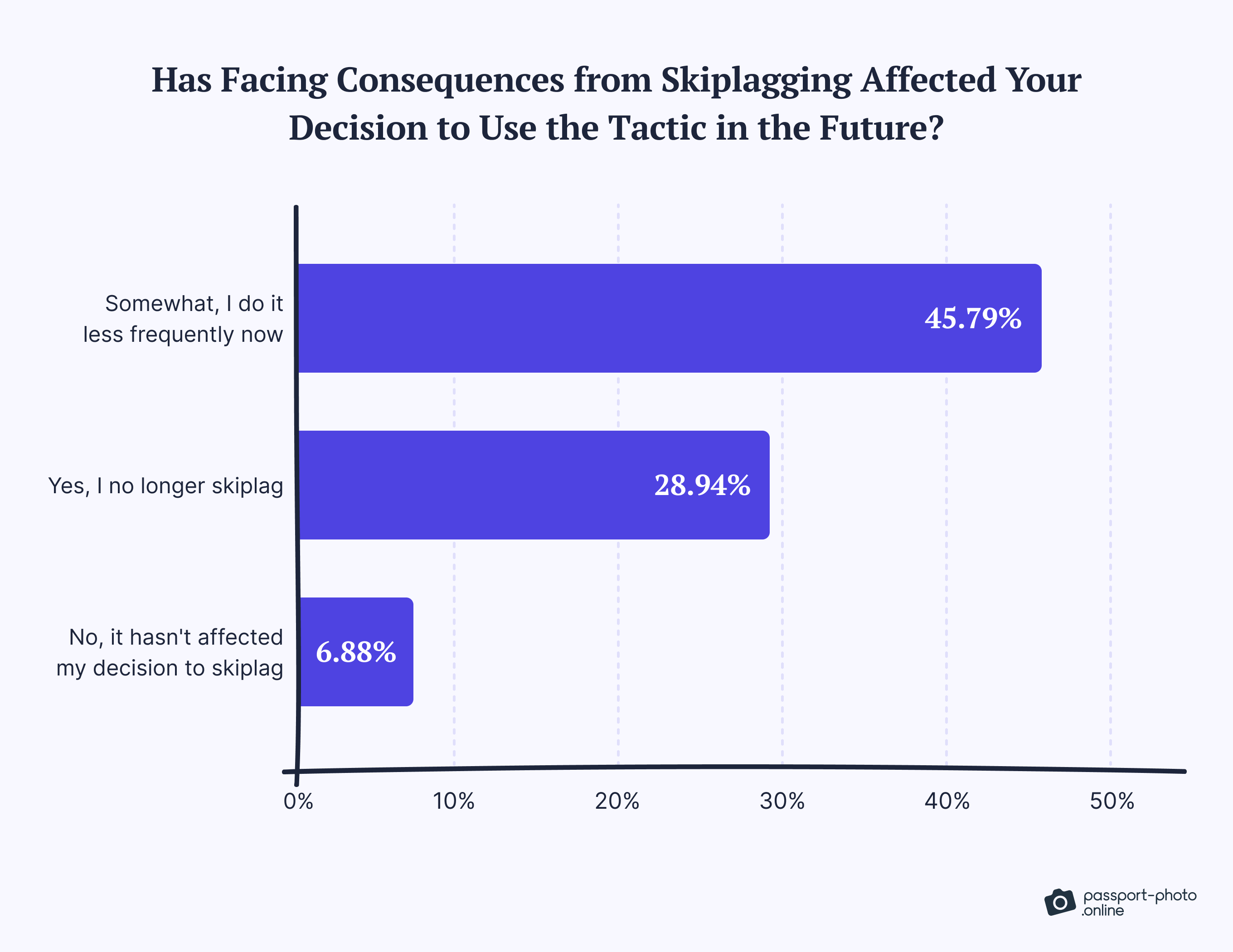
Indeed.
Nearly 75% of respondents reduced (46%) or stopped (29%) skiplagging after facing the music. That goes to show airlines’ countermeasures make some dents.
So—
Is skiplagging an ultimate travel hack or a one-way ticket to trouble?
That’s the question we’ll let you answer.
Stacking It All Up
There you have it.
A comprehensive look at Americans’ experience with skiplagging, also known as hidden-city ticketing.
Now—
If you believe your audience will be interested in this information, feel free to share it. Just remember to mention the source and link back to this page.
Methodology
We conducted an online survey of 1,004 US respondents (who had traveled in the past 36 months and had been primarily or jointly responsible for travel planning) via a bespoke online polling tool in October 2023.
The respondents were 48% male, 51.2% female, and 0.8% identified as other. 34.9% of respondents were 26 or younger, 43.1% were aged 27–42, 14.1% were aged 43–58, and 7.9% were 59 or older.
This survey has a confidence level of 95% and a margin of error of 3%. Given the gender and age makeup of our sample size, the study’s findings are statistically significant for the population at large.
This study was created through multiple research steps, crowdsourcing, and surveying. Data scientists reviewed all survey participants’ responses for quality control. The survey also had an attention-check question.
Sources
- LendingTree, “Cost of Domestic“
- Simple Flying, “How Airline Ticket Pricing Works”
- The New York Times, “The Risks of ‘Skiplagging’”
- The Points Guy, “A Small Victory for Bargain Hunters: Lufthansa Drops Lawsuit against ‘Skiplagging’ Passeng“
- The Points Guy, “Airlines Are Cracking Down on Hidden-City Tickets — Even for Top Elites”
- The Points Guy, “Banned for Hidden City Ticketing – Reader Mistake Story“
- Vox, “Lufthansa Sues Passenger for Using ‘Hidden City’ Fares to Save Money”

As a Digital PR specialist and a member of the Society of Professional Journalists (SPJ), Max has 5+ years of writing experience.
Over the course of his career, Max’s work has garnered significant attention, with features in numerous prominent publications such as The New York Times, Forbes, Inc., Business Insider, Fast Company, Entrepreneur, BBC, TechRepublic, Glassdoor, and G2.
